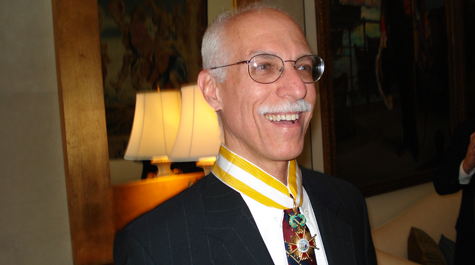W&M professor chronicles history of 700-year-old missing Spanish document
It’s been a decade and a half since manuscript hunter George Greenia discovered a missing medieval Spanish document in the archives at the University of Virginia’s Alderman Library.
Now Greenia, who serves as professor of Hispanic studies at the College of William and Mary, has chronicled his discovery and the historic contents of the 700-year-old manuscript in “The Lost Privilegio de Alcalá de Henares de 1295.” His essay is one of several pieces written by a group of medievalists in the anthology, La pluma es la lengua del alma: Ensayos en honor de E. Michael Gerli, published in September 2011.
The document, dated Aug. 8, 1295, is a concession of royal privileges signed by King Fernando IV granting freedom and liberties to the citizens of Alcalá during the Spanish Reconquista. According to Greenia, it’s also the fourth oldest document to mention the city, which lies about 20 miles east of Madrid.
The single sheet of sheepskin parchment, measuring 24 by 18 inches, is in immaculate condition considering its age, said Greenia. What it provides scholars is an invaluable piece of history into medieval democracy, he added.
“The emerging town council of Alcalá is flexing its muscles and asking for all the bishops and cardinals present at the royal parliament to be expelled,” said Greenia. “And so the King did – for a few days – and then they came back.”
The document also tells us that the town council did have some influence over the king, who was trying to stabilize the frontier of the Reconquista, said Greenia.
“The citizens of Alcalá wanted to negotiate for what the city was going to get in terms of concessions, privileges, and the freedom to exercise their own laws,” he said. “They also wanted their representatives – not just the nobility and bishops – as traveling counselors to the court to speak up on their behalf.”
In his essay, Greenia describes how rare it is to find medieval documents. He estimates that for every volume that survived during the Middle Ages, nine more were lost. Archivists have documented the disappearance of parchments from the 13th and 14th centuries, “some perhaps rolled into tubes to make fireworks.”
During the Spanish Civil War (1936-1939), the contents of city archives were sometimes stuffed into the barricades. Since they didn’t have sandbags, said Greenia, books were used instead.
And before the municipal archives were transferred to Madrid in the late 1970s, they “were still being kept in a top floor space subject to damp air and, when it rained, dripping water.”
How the charter came to America remains unknown. In 1972, the University of Virginia purchased the document from Bernard Rosenthal, a famed manuscript dealer. It’s been missing from Spain for perhaps a century, said Greenia, and there are no plans of repatriation.
“Documents scatter and manuscripts travel. It’s normal,” said Greenia. An original broadside of the Declaration of Independence printed on July 4, 1776, for example, unexpectedly turned up in London in 2008, he noted.
Sometime in the last 19th or early 20th century an unknown party, probably a Spanish dealer hoping to raise the market price of the unread charter, painted a “silly red dragon” on the left side, said Greenia.
“He’s kind of cute,” he quipped, “even though it’s totally unhistorical.”
There are several distinct markings on the parchment to authenticate the document.
“The most bold inscription is “Num. º2º” – a perfect match among the other numbered charters in the Alcalá city archives,” wrote Greenia. The inside also contains remnants of the king’s seal, along with signatures by his clerks and Fernand García, the guardian of the royal seal.
After discovering the document, Greenia traveled to Spain to meet with the mayor of Alcalá. He provided the mayor, and other Spanish officials, a photographic reproduction of the charter.
Greenia, a specialist in medieval studies, is a well-known visitor to Spain through his scholarly work with the Camino de Santiago pilgrimage. In February, Greenia worked with Hollywood stars Emilio Estevez and Martin Sheen on “The Way,” a new film about a father who travels to France after his son dies just one day into the pilgrimage.
On Saturday, Oct. 1, the College co-sponsored a preview screening of the film with the Embassy of Spain, the Library of Congress and the American Film Institute. The film, written and directed by Estevez, is due out in theatres this October.
In 2007, Greenia was awarded the Cross of Isabel the Catholic, Spain’s highest cultural achievement distinction for foreign nationals.


















